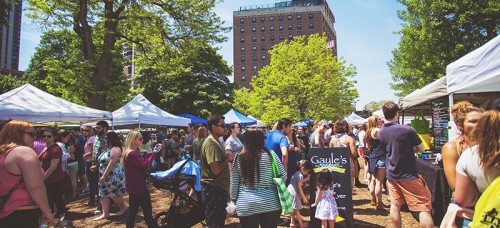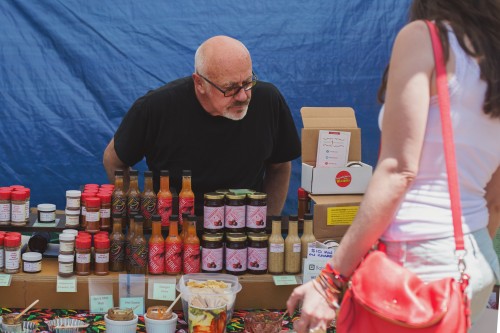
Farmer’s markets offer a simple, inexpensive way to eat fresh and meet your farmer — even in the heart of Chicago
Amid rows of colorful flower baskets and tomato plants, farmer Jose Compean stands. For years he and his family have harvested crops from the soil and hauled the week’s produce many miles from rural Indiana to the markets of Chicago.
Compean tries to do a few markets while in the city, and then returns home to start the circuit all over again. He said the life of a farmer is hard work, but it’s a rewarding experience.
“To me there is a greater joy to help customers,” Compean said while he arranged plants during the Daley Plaza Farmers Market. “It’s important to know your farmer. If you don’t, you don’t know what you’re eating.”
Compean is one of many who assemble in farmers markets across the city. Their goods attract bustling crowds of Chicagoans on any given day of the week, who come to find deals on organic food to support local growers or to simply have a good time.
There are more than 70 farmers markets across Chicago, according to the city’s website. They differ in shape and in size, yet their purpose — to bring local goods to the people of Chicago — remains the same.
The Daley Plaza Farmers Market in the Loop is by far the largest in the city, filling approximately 60 stalls and a stage with live music. Smaller and quieter venues such as the Lincoln Park Farmers Market cater more towards local residents. Green City Market runs all year round. The goods go inside after the first frost and return when the flowers blossom.
DePaul even has a farmers market at the Ray Meyer Fitness and Recreation Center, run by DePaul’s Urban Farming Organization (UFO), where the fruits and vegetables grown in the garden across from Wish Field are put up for sale. Profits go to the organization to buy seeds, plants and tools for next season.

Though each farmer’s market has its unique flair, most carry the standards. Fruits and vegetables are laid out on long tables, some so fresh that they still have dirt crumbs hanging off them. Flower baskets sit in rows through which people walk around and smell. Breads, pastries, pies and bagels are for sale, some eaten right out of the bag. More kinds of jam than you can count on your fingers stand tall in seemingly unbalanced stacks.
The fruit and vegetable menu changes with the seasons. In spring, farmers bring lettuce, herbs, spinach, radishes and sprouts. In summer there are ripe tomatoes, berries, peaches and cherries. With fall comes corn, pumpkins and apples.
Shopping at farmers markets is often cheaper than in stores such as Whole Foods. For example, a head of lettuce at Green City Market on average costs $2, compared to $2.50 at Whole Foods, according to the company’s website. Most products follow a similar price difference.
“Sometimes people think farmers markets are more expensive. But they’re not,” Kristen Holdsworth, DePaul senior and co-president of UFO, said.
Holdsworth, who also frequents farmers markets, said that farmers can sell their goods at a lower cost because they don’t have to transport them from faraway places and package it so intensely.
For those who don’t shop at Whole Foods, organic food can still be a good supplement for a healthy diet.
“Not everyone can purchase a completely organic diet,” Holdsworth said. “But you can grow. And you can buy at farmers markets.”
Most food at farmers markets is organic, or grown without pesticides. This means that farmers who grow organic don’t spill harmful chemicals into the environment, according to a study by Stanford University’s School of Medicine. However, the same study said that organic food is not more nutritious than conventional food.
By purchasing food directly from farmers, customers support their small businesses and can learn about food from the people who grew it.
“As a family farm we grow all the foods locally,” Monica Smits, who tends a vegetable stand at the Federal Plaza Farmers Market, said. “It’s good to buy from people who know what they’re talking about. Even if you don’t buy anything, you can still learn about the food.”
Some come to farmers markets just to have a good time with their friends and families. Holdsworth said that going in a group is a great way to experience markets for the first time.
“You can navigate together,” Holdsworth said. “It’s a very social experience.”
On some Saturday mornings, DePaul students Karin Gredvig and Shelly Cornell hop on the bus and after a quick ride arrive at Green City Market. “It’s just something nice to do on a Saturday,” Gredvig said. She said the seasonal apples taste especially amazing.
“The way we eat is our choice,” Holdsworth said. “The saying is true: you are what you eat. The healthier you eat the happier you are.”
Visit a local farmer’s market
Tuesdays:
Federal Plaza Farmers Market
Adams St. and Dearborn Pkwy.
May 19 — Oct. 27, 7 a.m. to 3 p.m.
Fruits and vegetables, baked goods, jams, dairy, barbeque, flowers
Wednesdays:
Green City Market
1800 N. Clark St.
May 2 — Oct. 31, 7 a.m. to 1 p.m.
Fruits and vegetables, baked goods, jams, dairy, tamales, salsas
Urban Islanders Market at Treasure Island
2121 N. Clybourn Ave.
May 13 — Sept. 30, 3 p.m. to 8 p.m.
Thursdays:
Daley Plaza Farmers Markets
50 W. Washington St.
May 14 — Oct. 29, 7 a.m. to 3 p.m.
Fruits and vegetables, jams, dairy, baked goods, occasional live music, plants, dog treats
Urban Islanders Farmer’s Market
3460 N. Broadway St.
May 14 — Oct. 1, 3p.m. to 8 p.m.
Saturdays:
Division Street Farmers Market
Division St. and Dearborn Pkwy.
May 16 — Oct. 31, 7 a.m. to 1 p.m.
Green City Market
Lincoln Park Farmers Market
Armitage Ave. and Orchard St.
June 6 — Oct. 31, 7 a.m. to 1 p.m.
Fruits and vegetables, baked goods
Sundays:
Logan Square Farmers Market
3107 W. Logan Blvd.
May 17 — Oct. 25, 10 a.m. to 3 p.m.
Pilsen Community Market
1800 S. Halsted St.
May 31 — Oct. 25, 9 a.m. to 2 p.m.
Also:
Urban Farming Organization’s farmers market at the Ray
Look on the Ray’s website for updates.
Fruits and vegetables, baked goods, soaps, salads













